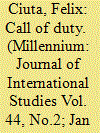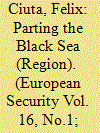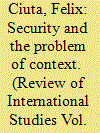|
|
|
Sort Order |
|
|
|
Items / Page
|
|
|
|
|
|
|
| Srl | Item |
| 1 |
ID:
144064


|
|
|
|
|
| Summary/Abstract |
This article attempts to further develop the IR research agenda on video games. The argument starts with a critique of the narrow focus on war-themed blockbuster games of current IR work on video games. I argue that this narrow view of IR and of video games is unsustainable and counterproductive, and has led to the positioning of IR as a regime of value with an unwarranted focus on the ideological effects of video games, and also to a paradoxical closing off of its research agenda. In the second half of the article I attempt to sketch two directions of research that could help overcome these initial limitations. The first outlines the potential for the IR study of the global aesthetic economy of video games, and the differentiated distribution of its regimes of value. The second encourages the study of game-worlds as practical-theoretical spaces where a particular relationship between academic subjectivity and its objects is constituted. The significance of this argument transcends IR video games research: it has relevance for cross-disciplinary issues regarding the status of academic moral-aesthetic judgements about cultural artfacts and practices; the relationship between academic and ‘popular’ knowledge; and the potential for political mobilisation at the interface of entertainment and social critique.
|
|
|
|
|
|
|
|
|
|
|
|
|
|
|
|
| 2 |
ID:
096036


|
|
|
|
|
| Publication |
2010.
|
| Summary/Abstract |
Energy security has received remarkably little conceptual attention, despite an abundant literature in which various meanings of the term proliferate, together with a copious proxy terminology. This article attempts to clear this conceptual underbrush and to address the question, in what sense is energy a security issue? Drawing on academic and policy-related sources, the article demonstrates that three distinct logics of energy security are currently in circulation: a logic of war, a logic of subsistence and a 'total' security logic. These distinct logics carry different meanings of energy and security, embed political hierarchies, and have distinct vocabularies, policy vehicles and normative consequences. Yet, affixing energy to security affects not only energy policy but also the manner in which we understand security itself. At least potentially, the ubiquity of energy as a 'prime mover' makes security ubiquitous, thus blurring the boundaries that have made it a domain of specialist knowledge and practice. By making security politically unexceptional and 'total', energy can thus strip security of its precise meaning, rendering it banal and vacuous. Taking a contextual perspective that emphasizes conceptual variation and the participation of lay actors in producing the meaning of security, the article rejects the banalization of security, and discusses the normative and political problems inherent in any totalizing view of the kind latent in energy security.
|
|
|
|
|
|
|
|
|
|
|
|
|
|
|
|
| 3 |
ID:
103748


|
|
|
|
|
| Publication |
2011.
|
| Summary/Abstract |
Undead, unkillable and uncannily, unceasingly trendy, 'geopolitics' strikes again. Marxist geopolitics could have been a good idea - for Marxists at least. This version doesn't work for two reasons: first, its emphasis on the inter-relationship between territory, capitalism and power makes it virtually indistinguishable from Marxism writ large; and second, it re-legitimates some of the familiar yet noxious tropes of classical geopolitics.
|
|
|
|
|
|
|
|
|
|
|
|
|
|
|
|
| 4 |
ID:
079721


|
|
|
|
|
| Publication |
2007.
|
| Summary/Abstract |
This article examines critically one of the most active regional dynamics of European security, centred on the Black Sea. Recently, the Black Sea region has received increased attention from a variety of political actors, who seek to increase the profile of the region in order to develop a common regional identity and an integrated approach to the security problems of the Black Sea region. This resurgence of the Black Sea region can be understood as the combined product of local interests, European integration and the 'global war on terror'. The main argument of the article is that Black Sea security integration is characterised by a fundamental contradiction between two different logics of security - geopolitical and institutional. Three other problems - transposition, fragmentation, and duplication - are also discussed. In the conclusion, the article examines the significance of the efforts to build the Black Sea region for the future of regional integration in European security
|
|
|
|
|
|
|
|
|
|
|
|
|
|
|
|
| 5 |
ID:
088091


|
|
|
|
|
| Publication |
2009.
|
| Summary/Abstract |
How do we know when we are dealing with security issue? This is a cardinal question in Security Studies, and securitisation theory provides and authoritative yet incomplete answer, mainly because it rules out that the meaning of security can vary contextually. To overcome this limitation, we need a hermeneutical perspective centred on the liminality of security as a category in-between theory and policy, which produces a more precise algorithm for empirical research. A contextual hermeneutics of security signals that normative awareness is necessary even in the absence of a unifying normative manifesto, also confronts the spectre of the "death of security" invoked by those who object to the potentially endless broadening of its meaning.
|
|
|
|
|
|
|
|
|
|
|
|
|
|
|
|
| 6 |
ID:
069839


|
|
|
|
|
|
|
|